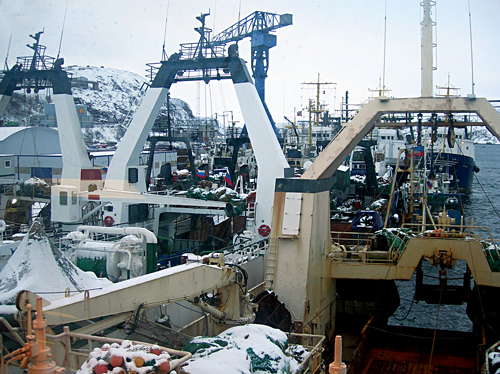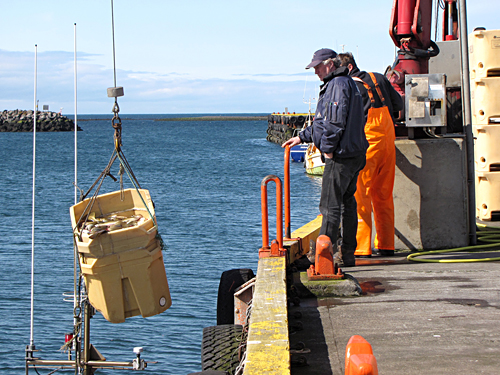The Arctic Centre of the University of Lapland participates in the EU project called Arctic Climate Change Economy and Society (ACCESS). ACCESS will evaluate the impacts of climate change on economic sectors such as fisheries, oil and gas extraction, and marine transportation. Dr. Anna Stammler-Gossmann is coordinating the socio-economic impact assessment on the fishery sector and related economic activities in the Barents region.
The projected shifts in the Arctic marine ecological structure can challenge the related national economic activities in different ways. Changes in the marine environment may cause biological changes in e.g. fish reproduction, distribution, and migration routes. In economic terms this can, for example, influence how much fish will be caught, or in which country the fish will come to shore. This also may lead to penetrating into 'new' fishing areas.
"Furthermore, most of the economically important stocks move between the zones of two or more states. Therefore, any changes may influence relations between these states. The impact of biophysical changes on human activities depends upon a complex set of interrelated factors that include not only the economic setting but also the legal and political settings of the fisheries", says Dr. Anna Stammler-Gossmann.
She also points out that "the ocean is a larger natural commons, where different human activities like marine transportation, and offshore oil and gas development take place. The ocean also has its borders in terms of economic zones or national borders, management of global commons, and complex human motivations. All actors in this system have to balance their activities constantly".
The Arctic Centre will examine Arctic fisheries, aquaculture and livelihoods in the context of changes in marine ecosystems. The research will focus on the analysis of the national and regional relevance of climate change, on the interactions between local and global actors in integrated ocean management, and on the interdependencies between economic sectors that are related to the marine environment.
In doing so, the assessment of national adaptation practices in the fishery sector relates to the planning of resource use, market and trading mechanisms, emergency preparedness, insurance and social safety schemes, infrastructure capacity and flexibility, and food security. On the regional and local levels the assessment is particularly concerned with the fishers’ perception of changes associated with climate change and the community’s adaptive agency.
An analysis of societal and cultural priorities in the fishery sector will consider the relative importance of fisheries to national economies and local communities, consumption patterns, and attractiveness of a job in the fishery sector as a career.
Evaluation of interdependencies between sectors and of the outcomes of the ocean sharing in the context of the predicted biophysical changes in the Arctic deals with the regulatory framework in the fishery and cross-sector activities, environmental legislation and national discourses on the international governing of marine resources. The regionally oriented research of the Arctic Centre is based mainly on Norwegian and Russian case studies.

Russian vessels in Kirkenes. Most of the Barents Sea cod caught by
Russian vessels has, since the early 1990s, been delivered to Norway and
other Western countries. Photo: Anna Stammler-Gossmann
Background
The ACCESS project (2011–2015) was selected in response to the first call of European Union programme called The Ocean of Tomorrow. 27 participants and 10 European countries are involved in the project. The European Commission supported the Arctic Centre research with near 360,000 euros.
Anna Stammler-Gossmann is a senior researcher in the Sustainable Development Research Group and in the Anthropology Research Team at the Arctic Centre. Within the project, she coordinates the socio-economic impact assessment on the fishery sector and related economic activities in the Barents region. In addition, she coordinates the activities of the Board of Ethical Issues.

Fish offload in fishing village in Sandgerdi, Iceland. Photo: Anna Stammler-Gossmann
For more information, please contact:
Dr. Anna Stammler-Gossmann, anna.stammler-gossmann(at)ulapland.fi
Project web-page
ULapland/AC/ML